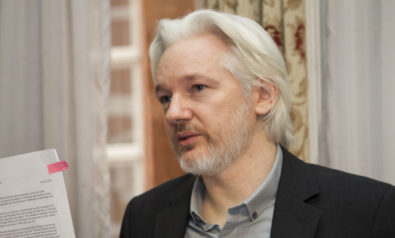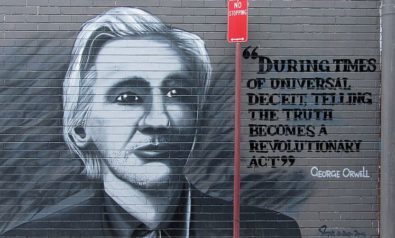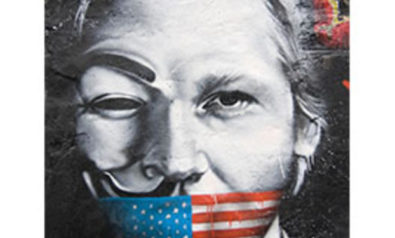Has Julian Assange been misrepresented in the unauthorized biography?
Julian Assange: The Unauthorised Autobiography is misleadingly mistitled, given that it was not written by Julian Assange. Nonetheless, he collaborated for a time with the author, Andrew O’Hagan, but never legitimated the work as his own statement or verified it with respect to facts. He certainly supplied information—precisely what we may never know—with a view to publication in satisfactory form. Nothing did take shape to his satisfaction, but the title was published regardless in 2012.
In early 2014, O’Hagan followed up with an article titled “Ghosting,” which relates impressions of his encounter with Assange. As the complementary insult for injurious aspects of the former work, it was received with much glee in the press. Even The Independent presented a cut-and-paste digest of “Ghosting” as an article, ending with its only noteworthy compliment—perhaps to suggest a fair and balanced nature. The latter quote, at least, is worth reproducing:
“At the time of the Egyptian uprising, [Hosni] Mubarak tried to close down the country’s mobile phone network, a service that came through Canada. Julian and his gang hacked into Nortel and fought against Mubarak’s official hackers to reverse the process. The revolution continued and Julian was satisfied, sitting back in our remote kitchen eating chocolates.
“What Julian lacked in efficiency or professionalism he made up for in courage. What he lacked in carefulness he made up for in impact.”
But apparently nothing made up for Assange’s neglect of O’Hagan’s writing assignment. Nor did he seem to recover in the latter’s estimation from displaying such hubris as to respond in kind with criticism to important people and institutions that had previously co-operated with WikiLeaks.
After all, consider it from their point of view: Shouldn’t it be preposterous that so many respected figures could be wrong together while the solitary object of their ire was right? Any structural problem that vast in society would be glaring through resulting atrocities.
Yet the ultimate hub of intellectual and physical atrocity, war of deceitful choice, must be due to some problem of that description, since it commandeered the English-speaking world for invasion of Iraq. Without such deep malaise, it would also be difficult to explain how the article above can typify current journalism. So it is by no means preposterous for this lone voice to be right while the provoked syndicate errs.
Defamation by Psycho-dramatic Narrative
One has to be fair to O’Hagan by granting that he writes in a fairly nuanced way that is at least compelling enough to keep you scanning the sentences. But if you bring a critical mindset to something like the excerpt below, you might not be so readily spellbound or consequently swayed.
“‘I have been detained,’ he said, ‘without charge, for 1000 days.’ And there it is, the old conflation, implying that his detention is to do with his work against secret-keepers in America. It is not. He was detained at Ellingham Hall while appealing against a request to extradite him to Sweden to answer questions relating to two rape allegations. A man who conflates such truths loses his moral authority right there: I tried to spell this out to him while writing the book, but he wouldn’t listen, sometimes suggesting I was naive not to consider the rape allegations to have been a ‘honey trap’ set by dark foreign forces, or that the Swedes were merely keen to extradite him to America. Because he has no ability to see through other people’s eyes he can’t see how dishonest this conflation seems even to supporters such as me. It was a trap he built for himself when he refused to go to Sweden and instead went into the embassy of a nation not famous for its respect for freedom of speech. He will always have an answer to these points. But there is no real answer. He made a massive tactical error in not going to Sweden to clear his name.”
O’Hagan asserts here that Assange’s detention has nothing to do with work against secret-keepers in America, almost as if it were entailed by the subsequent remark about rape allegations. But no such putative fact is established by anything in the embedding paragraph or essay.
Nor has it been made clear by any other writer, notwithstanding David Allen Green’s dismissive opinions. Rather, much is documented that substantiates the contrary view that political factors have conditioned the case through its unfolding from the beginning. Whether or not he is aware of such documentation, O’Hagan does nothing to accommodate anyone who might take it seriously, offering only dubious narrative with blunt assertion for substance. Perhaps he wishes to evoke an impossibility of dealing with childish irrationality any other way, yet such conceits tend to backfire where adults reserve judgment or respond.
The extent to which opinions can differ about Assange’s predicament is clearly vast, and O’Hagan quickly portrays the contrary view as unreasonable. This constitutes a practical problem. How do you, in Assange’s shoes for instance, reason with those who refuse to take you seriously until you admit the world is the way they see it?
Perhaps you could try massaging their prejudices to some point of amicable agreement, and that might occasionally work one-on-one. But “one-on-world” is a very different situation that calls for sticking to facts, responding to avalanches of distortion in the public space with razor acuity and otherwise throwing all back on their own judgment. Such necessity is obvious on a moment’s reflection, yet this particular reflection is naturally rare. Sadly, it is also needed to counter a naive presumption that the behavior just mentioned is due to arrogance or narcissism.
Jemima Khan, for instance, just couldn’t understand why Julian didn’t have time to talk her through the flaws in Green’s attack, and this grievance was bandied everywhere as another proof of Assange’s failures. Like O’Hagan, she also thought Assange should have really appreciated Alex Gibney’s film, We Steal Secrets—the thrust of which is that WikiLeaks was a great thing for which Assange deserves credit, though he’s hopelessly lost the plot now. Their received wisdom appears to be that if Assange really cared about the ideals of WikiLeaks, he would not object to such criticism but take the reproof to heart and get on the right track again. He should not be so self-absorbed and instead cooperate more with those holding different views, or being nearer to establishment, since they can help bring the ideal to manifestation.
Yet it is plainly ironic that adherents of this view betray the ideal they affirm by dismissing its unrivaled exponent. Nor is it consistent to pose as worthy of more trust while fomenting antipathy with complaints that his role is not better played.
Aspersive Terms in Scatter-shot
Two pivotal negative words used by O’Hagan are “obsessing” and “paranoid,” of which something should be said in turn. “Julian had lost all those appeals that had so preoccupied him, but was no less preoccupied and no less time-wasting. He was obsessing about the DreamWorks film and said it was bound to be a smear.”
Conveyed in neutral terms, the imparted facts would be unlikely to make the reader surmise that Assange was being obsessive. Indeed, one cannot obsess about something unless it is trivial in context, yet a big-budget movie about WikiLeaks could easily erode the standing of WikiLeaks as an organization. So, the only information conveyed by choice of the term “obsessing” here is that the author describes Assange as obsessive with no evident warrant.
This is the pattern with a host of negative terms on which the article’s impact depends. All the prime examples are showcased in the aforementioned articles, as an automatic result of contemporary news echoing, and as usual, all that gets left out is any thought of how unsound the entire critique may be.
The use of the term “paranoid,” which has long been obligatory when mentioning Assange, is supposedly vindicated in O’Hagan’s article by reference to things like one mistaken assumption Assange made about being followed, or his checking behind foliage for assassins.
Indeed, someone should let Julian in on the fact that when a raft of public figures and authorities call explicitly on mainstream media for your precipitous death, or describe your status as that of an enemy combatant, all they could possibly mean is that they hope to someday give you a big fuzzy cuddle and a huge slice of apple pie. And if you must worry that there might be some other meaning in there, just activate a security plan that banishes any strained response to emerging circumstances. Failing to achieve this, even without an army or bunker, clearly warrants derisory anecdotes.
And really, who should be so bothered by Assange’s projects as to go after him? Certainly the last James Bond installment vilified a white-haired hacker. But that’s just a movie. Would any set of contractors or public servants on the intrigue side of things actually be moved to act on the official view regarding Assange’s harm or threat to security? In other words, might those who really espouse that view ever take their job seriously? Even bizarrely assuming that none ever would, it strains credulity to describe the security circus around the Ecuadorian Embassy in London, lately exceeding £12 million, as intended for Julian’s protection.
Despite that aberrant claim, it seems everyone is meant to know—perhaps because it’s repeated by the right people—that Assange’s fears for safety are sheer and groundless paranoia. Likewise for other alleged character flaws (arrogance, narcissism, etc.) such that many writers grant them as fact, whether mostly agreeing with O’Hagan or apologetically begging to differ. If this counts as swimming with the stream, it might just as well be called splashing in a swamp.
Consider instead a ground rule with merits only limited by our capacity to abide by it: Never take anyone seriously who expects to be believed as to what occurs in another’s mind without supporting it with more than narrative, non-sequiturs or concurrence of bedfellows.
Strip all the latter from O’Hagan’s piece and you have a small set of facts confirming that Julian Assange is in some ways ordinary and in others extraordinary—none of the latter being appalling and several being most laudable. But the moral is not so much about Assange as a literary and media culture of slanderous psychoanalytic conceit.
Perhaps it’s debatable whether it’s ever necessary to indulge besmirching, but if 50 pages of “Ghosting” is worthy of the London Review of Books, then contemporary literature begs for an upturn.
The views expressed in this article are the author’s own and do not necessarily reflect Fair Observer’s editorial policy.
Photo Credit: New Media Days / David Shankbone
 We bring you perspectives from around the world. Help us to inform and educate. Your donation is tax-deductible. Join over 400 people to become a donor or you could choose to be a sponsor.
We bring you perspectives from around the world. Help us to inform and educate. Your donation is tax-deductible. Join over 400 people to become a donor or you could choose to be a sponsor.
Support Fair Observer
We rely on your support for our independence, diversity and quality.
For more than 10 years, Fair Observer has been free, fair and independent. No billionaire owns us, no advertisers control us. We are a reader-supported nonprofit. Unlike many other publications, we keep our content free for readers regardless of where they live or whether they can afford to pay. We have no paywalls and no ads.
In the post-truth era of fake news, echo chambers and filter bubbles, we publish a plurality of perspectives from around the world. Anyone can publish with us, but everyone goes through a rigorous editorial process. So, you get fact-checked, well-reasoned content instead of noise.
We publish 2,500+ voices from 90+ countries. We also conduct education and training programs
on subjects ranging from digital media and journalism to writing and critical thinking. This
doesn’t come cheap. Servers, editors, trainers and web developers cost
money.
Please consider supporting us on a regular basis as a recurring donor or a
sustaining member.
Will you support FO’s journalism?
We rely on your support for our independence, diversity and quality.












